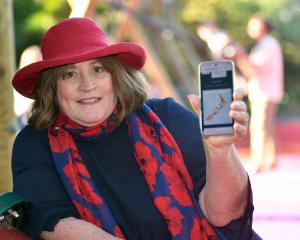
There are not many companies that can claim a cricket victory over Australia ... but Harraways is one of them.
It is one of the first stories outgoing chief executive Stuart Hammer thinks of when he tells someone about the company. That one and the one about how the company’s founder had 21 children to the same wife.
Mr Hammer said in his 20 years at the helm of the oats manufacturer his work helping the farmers that provide the grain was one of his most important achievements.
"The growers are significantly important to us because that’s the source of the grain that we use.
"They’re all local growers."
Those growers are largely based in Otago and Southland.
Mr Hammer’s successor, Henry Hawkins, stepped in to point out the important role his predecessor had in setting up the Oat Industry Group.
"The Oat Industry Group — you particularly were a key driver in setting up an oat industry group — which is again looking after farmers," Mr Hawkins said, pointing to Mr Hammer.
"It’s really helping the arable farmers in terms of growing oats and making it another source of income apart from wheat and barley, and sheep and so forth."
The Oat Industry Group was set up to fund research on grain cultivars to give continuity to the industry, Mr Hammer said.
"The growers and ourselves contribute to that research as well as then contracting a research company to create new cultivars, which in the last 10 to 15 years have increased grain yields above double digits, which is pretty significant in terms of grain."
As he moves on to a retirement focused on golf, a bit of cycling and time with his grandchildren, Mr Hammer is in the background giving advice to Mr Hawkins as he beds into the new job.
"It’s not hard to let go," Mr Hammer said.
"It’s time to let go and bring someone new and vibrant into the business."
He was proud of his legacy at Harraways.
"The main highlight is the growth the company’s gone through in the last 20 years. [It is] pretty significant in terms of any manufacturing business.
"We’ve built the staff numbers up significantly. Got a lot of systems in place that were never there beforehand."
The company now employs 60 fulltime staff in Green Island and is a significant client of Toll, the logistics company it uses to send product around the country.
Part of the success of the company has been in keeping with its core product — oats.
"An oat’s an oat’s an oat in terms of New Zealand," Mr Hammer said.
"It has some better nutritional qualities compared to some overseas countries, for example. For example the fat levels are lower than [in an] Australian oat ..."
He said he does enjoy porridge for breakfast "not all the time but some of the time".
How does he have them?
"I’m a new age guy ... in the microwave."
Henry Hawkins has been brought in as the new chief executive for his international and export experience and knowledge.
He started as an apprentice baker and worked his way up in the industry, through manufacturing to commercial and operations for a bakery ingredient and manufacturing company called Bakels.
He spent time in various roles in Fiji and Malaysia and came back to New Zealand as a regional director for the company in Auckland.
In that role he looked after exports to areas such as the Middle East, Southeast Asia, Africa, India and a little in Europe as well.
"I had a big portfolio of countries and hence the move back to a more local business because you can only do so much travel. It drives you crazy after a while.
"It sounds glamorous [but] it can take its toll."
Mr Hawkins was well aware of the pressure on him, taking the reins of a 150-year-old Dunedin company.
"There’s a weight of expectation to at least maintain the level that Stuart’s achieved to grow the business [and] to find new avenues.
"We do see export as a big opportunity, hence my appointment with my leads and contacts and knowledge."
Export had its difficulties and it was something the company would do with caution, Mr Hawkins said.
"Coming back to my roots — working in food — people have to eat and always need to eat. Oats and porridge are a staple part of many people’s diets so its not fraught with danger, but we’ve just got to be careful with how we approach markets now and potentially just on a bit of a go-slow in terms of trying to build momentum in Southeast Asia in particular. Overall, people have to eat, so [I’m] not concerned."
Harraways already sells into Singapore and has "good sales there," Mr Hawkins said.
They also sell into Malaysia, Hong Kong and even some minor sales into China, "which have naturally slowed up right now," Mr Hawkins said.
The new Harraways chief executive was enjoying his new surroundings.
"I’ve been here for a month ... people have been welcoming internally, people I’ve met externally have been fantastic as well. I think it’s a great community.
"I’m nervous about the winter ... but let’s deal with that as it happens."
His son is studying in Dunedin, but his wife and daughter were still in Auckland and Mr Hawkins was planning regular weekend trips up.
"It’s totally doable ... I was doing that for my last role where I was based in Auckland. I’d get on a plane and fly 10 and a-half hours to Singapore and do that every two weeks and then bounce around Southeast Asia.
"Doing it Dunedin to Auckland is nothing ... the only [obstacle] is when you see the price of Air New Zealand tickets are three and four hundred dollars."
Advertisement













